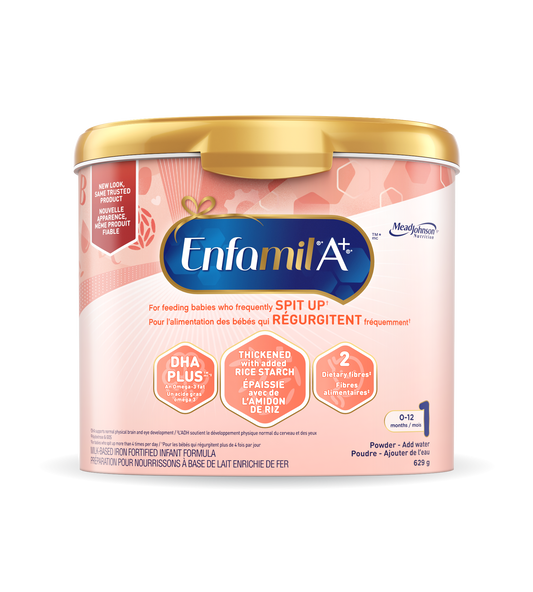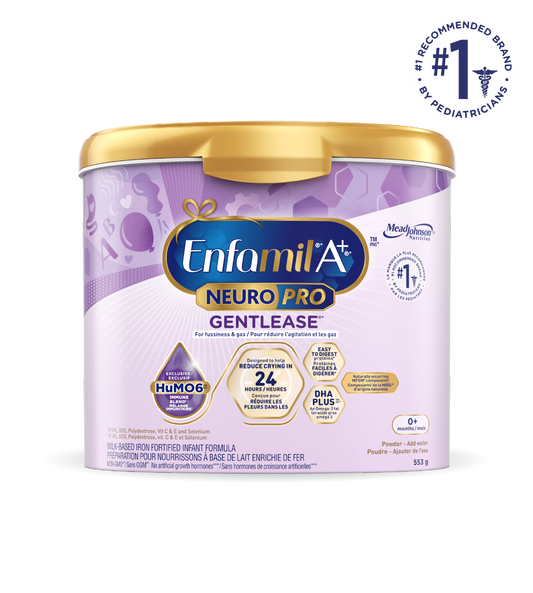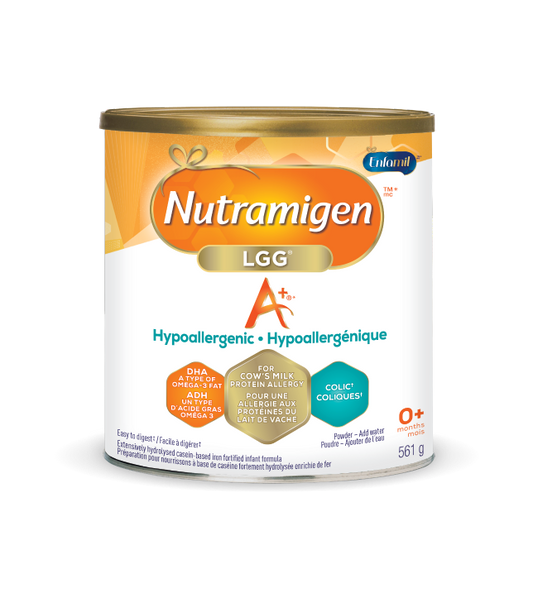It's not uncommon for babies to spit up occasionally as their digestive systems develop.1 If you notice your baby spitting up, there is probably no need to worry.1,2,3 It's rarely a serious medical issue.1,2,3 In fact, a baby who's spitting up a lot, yet has no pain associated with spitting up and otherwise seems content, is frequently called a happy spitter. Learn more about what makes your baby spit up, how to reduce spitting up, how to tell if it’s spit-up vs. vomit and the rare occasions when spitting up can be cause for concern.
What Makes Babies Spit Up?
Infant or baby reflux, also called spit-up or gastroesophageal reflux (GER), is very common in healthy babies.1,2,3 It occurs when a baby’s stomach contents back up into the esophagus after a meal.1,3 With babies, when the lower esophageal sphincter opens, stomach contents often back up into the esophagus and come out of the mouth, resulting in spit-up.1,3
If you think about how small a newborn is, this makes a lot of sense. Newborn stomachs can really only hold about 2-3 fluid ounces at a time, and it can be easy to overfill it. As the motor coordination and muscle tone strengthen, especially in the stomach and esophagus, food is held down better.1,3
Common experiences include the following:1,3
- The effortless spitting up of 1 or 2 mouthfuls of milk or formula
- Spit-ups usually occurring during or shortly after feedings
- Smaller spit-ups occurring with burping
- Larger spit-ups occurring after overfeeding
- Normal infant reflux usually does not cause crying
When Do Babies Start and Stop Spitting Up?
More than half of all newborns spit up in the first three months of life. Baby reflux usually begins in the first weeks of life and tends to peak between one and four months of age. When do babies stop spitting up? By twelve months of age, most babies are done with the spitting-up phase of development.1,3
Are There Ways to Reduce Spit-Up?
Yes, there are strategies to help limit or reduce the amount and frequency of spitting up. Try these tips:1,3
- Keep baby in an upright position. To reduce spitting-up, try holding your baby upright for twenty to thirty minutes after feeding...and if your arms get tired, it's fine to use a front pack, backpack or infant seat.
- Burp your baby about every 5 minutes throughout feeding time. Taking the time to burp your baby frequently both during and after a feeding will keep air from building up in his digestive tract.
- Avoid too much activity after a feeding. Active play right after eating, like putting your baby in a jumper or infant swing, can keep the food from settling in your baby's stomach. Giving your baby's food time to digest will help keep it down.
- Turn her bottle upside-down to check the flow. It should come out one drop at a time, not a steady stream. Change the flow by adjusting the tightness of the bottle-top screw ring or by changing to a slower flow nipple.
- Avoid tight diapers, as they put added pressure on the stomach.
- Reduce pacifier time. Constant sucking can pump your baby's stomach up with swallowed air.
- If your baby is frantic, stressed or is rushing through feeding, calm him down first. Then try feeding him again.
- Try to avoid disruptions like bright lights or unusual noises during a feeding.
- Give smaller, more frequent feedings to reduce the chances of spit-up.
Can Formula Reduce Spit-Up?
Yes, Enfamil A+ makes formula to help reduce spit-up.* Enfamil A+ for Frequent Spit Up contains rice starch that becomes thicker in a baby's stomach and is clinically proven to reduce spit-up. It also contains a blend of two dietary fibres, GOS and polydextrose, shown to soften stools.† If your little one continues to have frequent spit-up, ask your doctor if Enfamil A+ for Frequent Spit Up is a good next step.
Can I Use Acid Reducers to Reduce Spit Up?
You shouldn’t give acid reducers to your infant without first consulting their healthcare provider.4 They do not help with spit-up or fussiness, and they increase the likelihood of infection and compications.4 Before looking to acid reducers, try the above techniques for reducing spit-up or a formula designed to help. Talk with your child’s doctor about the best course of action and be sure to follow their advice carefully.
Is My Baby Spitting Up More than Normal?
How much spit-up is too much? There really aren't any rules. Minimum spitting-up doesn't hurt, but if you feel it's causing your baby some discomfort, you might try the above tips for reducing spit-up. If you’re still concerned, see if your baby is experiencing any of the below causes for concern.
Is It Spit-Up or Vomit?
How can you tell if it’s baby vomit vs. spit-up? Spitting up should not cause discomfort or upset, is most likely to occur just after eating and involves no effort or strain.1 Vomiting is forceful, usually upsetting and produces a much greater volume than just spitting up.1 Vomiting can be a sign of a viral infection in the stomach, an allergic reaction or another gastrointestinal problem.1 If you think your baby is vomiting, you should consult their doctor.1
When Is Spitting Up a Problem?
A small percentage of babies experience reflux with complications. If spit-up accompanies these symptoms, talk to your baby's doctor:1,3
- Poor weight gain
- Vomiting associated with irritability
- Feeding refusal
- Difficulty swallowing
- Arching of the back during feedings
- Sleep disturbance
- Respiratory symptoms
- Spitting up after one year of age
- Spitting up accompanied by fever
Knowing why babies spit up and how to help reduce it can make this aspect of your infant’s first year much more manageable. For other articles and videos on what you and your baby may need to be healthy and happy, visit our Tips and Resources hub.

Learn more about Enfamil A+ for frequent Spit Up.
† Studied in Enfamil A+ infant formula compared to same formula without fibre blend.
* Based on the percentage of doctors who recommend a specific formula.
- https://myhealth.alberta.ca/Health/Pages/conditions.aspx?hwid=sig54847spec
- https://www.canada.ca/en/health-canada/services/canada-food-guide/resources/nutrition-healthy-term-infants/nutrition-healthy-term-infants-recommendations-birth-six-months.html
- https://www.healthlinkbc.ca/pregnancy-parenting/parenting-babies-0-12-months/baby-health/gastroesophageal-reflux-babies-and
- https://choosingwiselycanada.org/wp-content/uploads/2017/02/Paediatrics.pdf










